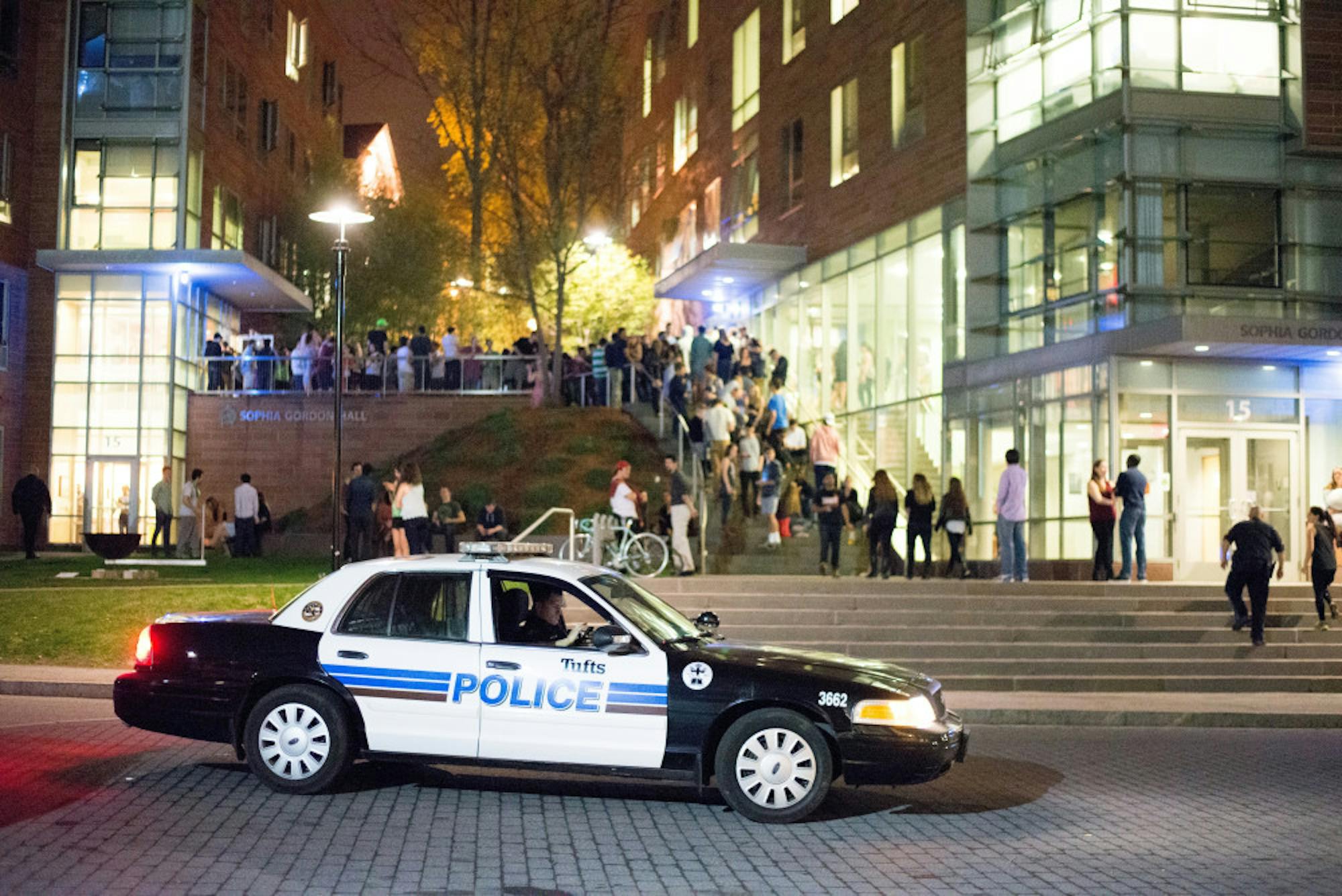There has been a decrease in the total number of neighborhood noise complaints received by Tufts University Police Department (TUPD) since students received an email from Student Affairs on Sept. 25.
In the email to the community, Director of Public and Environmental Safety Kevin Maguire and Dean of Student Affairs Mary Pat McMahon reminded students of the importance of being respectful in the Medford and Somerville neighborhoods and observing local laws and ordinances.
"This semester there have been numerous community complaints about disruptive behavior by Tufts students," the email read. "In response to the number of recent noise complaints, our host city police departments and the Tufts University Police will be enhancing efforts to proactively quell neighborhood noise and disturbances."
According to Maguire, TUPD has received a total of nine neighborhood noise complaints during the past three weekends, a decrease from the 22 noise complaints TUPD received in the first three weekends of September.
"[McMahon and I] feel that this joint communication, as well as the echoing of that messaging by student leaders relative to being good neighbors, was well received by students living in the neighborhoods immediately adjacent to campus,” Maguire told the Daily in an email. "[We were] pointing out the need to be good, responsible citizens and highlighting the impact that disruption of residential neighborhoods can have on families and residents."
Judicial Affairs Officer Mickey Toogood said that most noise violations occur during the first three to six weeks of the year, when everyone is celebrating the start of their academic year.
“It is warmer, and both the windows of students and their neighbors are open,” he said. “Later on, when the classes get serious and the mid-terms begin, the number of noisy parties usually drops.”
Toogood explained that, every year, the university issues several fines for noise complaints in this early period of the academic year, which help limit the number of noise violations later on in the year. He said that there is a $300 fine for first-time off-campus noise violations, and in rare instances when a second noise violation occurs in the same year, the fine doubles to $600. After the first fine, people make an effort not to repeat being noisy, he said.
“Unlike Somerville and Medford, who charge per resident, the violation fines imposed by the university are issued per residence/house," Toogood said. "We charge a $300 collective fine to the entire house as opposed to each resident."
He explained that there was recently a case in which three residents living in the same house were each fined $300 by the Somerville Police Department.
“In my meetings with students, I do my best to explain to them why they are being fined," Toogood said. "No one is happy to be fined, and I think it is good to warn students about consequence of their violations beforehand and for them to understand why we have that policy."
Tufts Community Union (TCU) President Brian Tesser agreed that neighborhood noise levels usually go up on weekends when off-campus houses have activities, which decrease as the temperature outside drops.
“Now that the weather is colder and windows are closing down, the number of noise complaints have gone down,” Tesser, a senior, said.
Although noise levels are decreasing, noise complaints are still a cause of concern, not only for the neighbors, but also for students who are actively making efforts to protect the peace and comfort of others and are looking to better integrate into the Tufts neighborhood, Tesser said.
According to Toogood, the Dean of Student Affairs Office has followed up on the Sept. 25 message with reminder emails to the student body about the enforcement of the Tufts' Noise and Off-Campus Disturbances Policy, which is detailed in the Student Handbook, as well as emails, including one sent before Halloween, about noise ordinances in Medford and Somerville.
"Previously, I’ve been consistently holding meetings with students who allegedly violated Tufts’ Noise Policy and/or Somerville or Medford noise ordinances," Toogood said.
Maguire said that the statistics on noise violations only capture activity that is reported to TUPD. He added that TUPD works collaboratively with the Somerville and Medford police departments, sharing information about neighborhood complaints and advising them of significant campus events and activities that could potentially impact the surrounding communities, as well as assisting with off-campus issues upon request or during exigent circumstances.
"My office has met with members of the Somerville and Medford community, and our police department is in communication with the Medford Police Department and the Somerville Police Department," he said.
Maguire said that TUPD is hopeful that numbers of noise complaints will continue to decline and that Tufts students will continue to keep in mind that noise complaints can adversely impact the quality of life for all neighbors.
“We are thankful that the complaint numbers are heading downward and commend students for their efforts,” he said.
TUPD records reduction in noise complaints in surrounding neighborhood

TUPD breaks up the Around the World party at Sophia Gordon Hall on the night of May 9, 2014.





